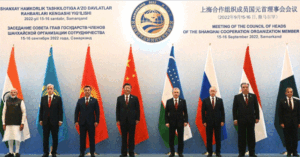
The 2025 Shanghai Cooperation Organization (SCO) Summit, held in Tianjin, China, has set the stage for a new era of international cooperation. With leaders from across Eurasia—including China, Russia, India, Pakistan, and others—the summit highlighted the bloc’s determination to shape a just, equitable, and multipolar world order.
Historic Gathering & the Tianjin Declaration
This year’s summit was the largest in SCO history, marked by extraordinary diplomatic warmth. The adoption of the Tianjin Declaration and a 10-year development strategy (2026–2035) provided a solid foundation for future cooperation. These key documents outline a roadmap for economic growth, security, and cultural exchange, signaling the SCO’s ambition to be a leading voice for the Global South.
Strengthening Security Cooperation
The summit addressed pressing security concerns, approving 20+ agreements. Notably, new centers will focus on countering terrorism, drug trafficking, and cybersecurity threats. The Regional Anti-Terrorist Structure (RATS) will be further strengthened, ensuring the SCO remains a security anchor for the region.
Economic Collaboration & Green Growth
On the economic front, leaders pushed for the establishment of an SCO Development Bank, aiming to boost trade and investment within member states. Additional agreements covered:
-
A roadmap for energy cooperation
-
A green industry development statement
-
Expanded collaboration in artificial intelligence and the digital economy
China announced 12 billion yuan in grants and loans to SCO nations, reflecting its commitment to shared prosperity.
Diplomatic Breakthroughs & Cultural Dialogue
The summit also served as a platform for bilateral diplomacy. Indian PM Narendra Modi’s meeting with Chinese President Xi Jinping—their first in seven years—signaled progress on border issues and trade ties. Meanwhile, Pakistan supported a strong joint condemnation of terrorism. India’s proposal for a Civilizational Dialogue Forum was welcomed as a tool to enhance cultural and people-to-people exchanges.
Toward a Multipolar Future
For member states like Iran and Belarus, the SCO’s vision of multilateralism offers an alternative to Western dominance. By rejecting zero-sum politics, the summit reinforced the bloc’s identity as a voice of the Global South.
The Tianjin Summit 2025 was not just about handshakes and speeches—it delivered actionable strategies for security, growth, and unity. It marks a defining stride toward a more connected, resilient, and multipolar world.